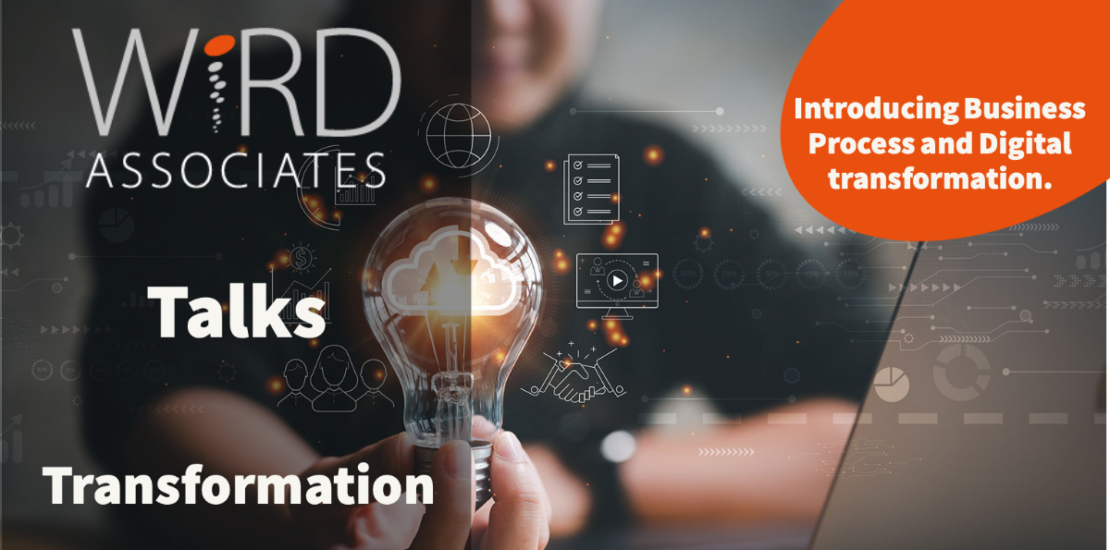- 2023-08-09
- Posted by: Adrian Williams
- Categories: Business Analysis, Business plans, Innovation

What is business process transformation and Digital transformation and why is it relevant in today’s business environment?
Why is Business Process and Digital Transformation relevant?
We at WiRD Associates have found a marked increase in customer requirements and demands within the financial services sector over the last five years. This has primarily been driven by clients expecting a high degree of personalised service at increasingly lower price points. This coupled with the increasingly demanding regulatory requirements in the Financial Services industry is needing an increasingly deep overhaul of current business and operating models.
In our experience, at the heart of these business and operating models lies the business processes that drive these models. This fundamental change to business and operating models is therefore causing the transformation of these underlying business processes. This need is also intensifying because of the need to compete in an increasingly digital world. This need to transform is therefore becoming increasingly important because of the need to supply digital services that enables cost effective personalised and highly responsive Financial Services products and services. Gone are the days when Financial Services organisation only supply services between 8am and 3pm and where responses to requests such as home loans and personal loans could take up to 10 days or more. As a result, most Financial Services organisations are currently involved in business process and digital transformation.
So, what is some of the benefits of business process and Digital transformation?
Some of the benefits of process transformation we have experienced can best be described as the process of simplifying and automating business processes to:
- Improve customer experiences.
- Dramatically reduce processing times.
- Dramatically reduce the processing cost of most Financial Services products and services.
- Create “intelligent,” and to a large degree self-governing business services and products.
So, in our view, the purpose of Business Process and Digital Transformation is to use digital technologies to improve the efficiency and effectiveness of an organisation’s business processes. This includes automating tasks, streamlining workflows, and improving collaboration.
We have found Digital transformation to be a broader concept, it involves using digital technologies to change the way a business works. This can include changes to the way products are developed, the way customers are served, and the way the business is managed.
We therefore see process transformation as a key part of digital transformation. By improving the efficiency and effectiveness of business processes, organisations can free up resources to focus on other areas of digital transformation, such as innovation and customer experience.
Here are some examples of how we have used process transformation in digital transformation:
- Automating tasks: This can free up employees to focus on more strategic tasks, and it can also help to improve accuracy and consistency.
- Streamlining workflows: This can help to reduce bottlenecks and improve the flow of information.
- Improving collaboration: This can help to break down silos and improve decision-making.
- Introducing “intelligent” business processes”: Creating self-governing and “intelligent processes that interact directly with customers with the incorporation of AI (Artificial Intelligence) and ML (Machine Learning).
- Maintaining compliance: Keep all business processes compliant with relevant regulatory (governance) requirements.
- Introducing personalisation of services and products: Cost effective personalisation of business processes in a way that enhances the customer experience and helps with customer retention.
- Enhanced competitiveness: Enhanced competitiveness through paid customisation of services and products.
What are some of the benefits of business process and Digital transformation?
Process transformation is not a one-time event. It is an ongoing process that requires continuous improvement. By continuously looking for ways to improve business processes, organisations can stay ahead of the competition and deliver better value to their customers.
Here are some of the benefits of business process transformation:
- Improved efficiency: Process transformation can help to reduce costs and improve productivity.
- Improved customer experience: Process transformation can help to improve the customer experience by making it easier to do business with the company.
- Increased innovation: Process transformation can help to free up resources to focus on innovation, which can help the company to stay ahead of the competition.
- Optimised Cost-to-serve ratios: Streamlined processes and self-governing processes lead to enhanced cost-to-serve ratios.
Some lessons learnt
We have found that when considering a process transformation, there are a few things need to be considered:
- Start with a clear understanding of your current processes: What are the key processes that need to be improved? What are the goals of the transformation?
- Find the right technologies: There are a wide range of technologies that can be used to improve business processes. You need to find the right technologies for your specific needs.
- Get buy-in from all stakeholders: Process transformation is a team effort. You need to get buy-in from all stakeholders, including employees, customers, and management.
- Measure the results: It is important to measure the results of the process transformation so that you can see what is working and what is not.
We have found business process transformation to be a complex and challenging undertaking, but it can also be an extremely rewarding one. By carefully planning and executing a process transformation, you can improve the efficiency and effectiveness of your business, improve the customer experience, and increase innovation.
What is your experience with business process transformation and digital transformation? How important are these forms of transformation to you and your organisation? Please share your experiences with WiRD and each other by commenting or interacting on LinkedIn
